List of animal sounds
Appearance
(Redirected from Mooed)
Certain words in the English language represent animal sounds: the noises and vocalizations of particular animals, especially noises used by animals for communication. The words can be used as verbs or interjections in addition to nouns, and many of them are also specifically onomatopoeic.
List of animal sounds
[edit]| Picture | Animal | Description | Sound |
|---|---|---|---|

|
Alligator | bellow, hiss | |

|
Alpaca | alarm call, cluck/click, hum, orgle, scream[1] | |

|
Antelope | snort[2] | |

|
Badger | growl[3] | |
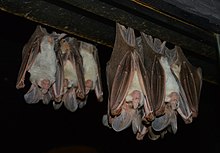
|
Bat | screech,[4] squeak, eek | |
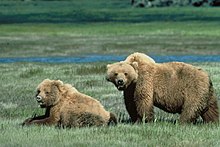
|
Bear | roar, growl | |
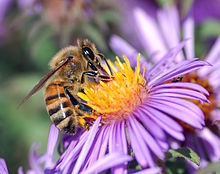
|
Bee | buzz | |

|
Big cat (Tiger, Lion, Jaguar, Leopard) | roar,[5] growl,[6] snarl[7] | |

|
Camel | grunt | |
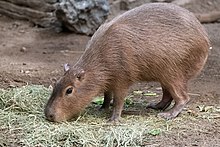
|
Capybara | squeak,[8] chatter, bark | |
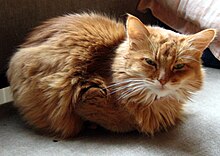
|
Cat | mew, meow, purr, hiss, trill, caterwaul, growl | |

|
Cattle | moo, low | |
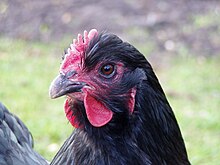
|
Chicken | cluck, buck, crow[9] cha-caw, bah-gawk (female)[10] cock-a-doodle-doo (male) |
|
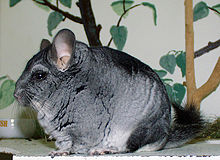
|
Chinchilla | squeak[11] | |

|
Cicada | chirp[12] | |

|
Crab | chirp, click, creak[13][better source needed] | |

|
Crane | clang | |

|
Cricket | chirp | |

|
Crow | caw, cah[14] | |

|
Curlew | pipe[15] | |

|
Deer | bellow, bell (buck), bleat (doe, fawn) | |
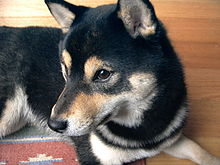
|
Dog | arf, bark, boof, bay, howl, growl, snarl, moan, whine, whimper, yelp, scream, sigh, sneeze, woof, yip | |

|
Dolphin | click,[16] whistle[17] | |

|
Donkey | hee-haw,[18] bray | |
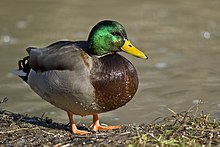
|
Duck | quack | |

|
Eagle | screech[19] | |

|
Elephant | trumpet | |

|
Elk | bugle (male),[20] bleat (calves)[21] | |
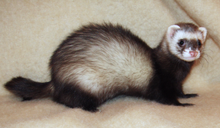
|
Ferret | dook[22] | |
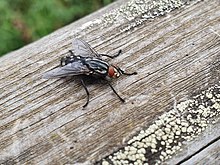
|
Fly | buzz[23] | |

|
Fox | bark, scream, howl, snore, gecker[24] | |

|
Fish | glub | |

|
Frog | croak, ribbit | |

|
Gaur | low, moo | |
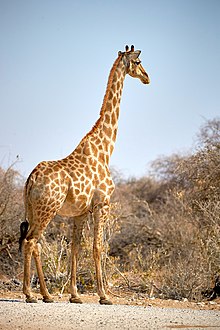
|
Giraffe | bleat,[25] hum[26] | |
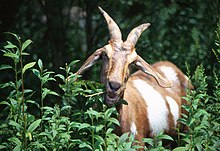
|
Goat | bleat, maa | |
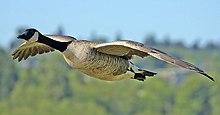
|
Goose | honk, hiss | |
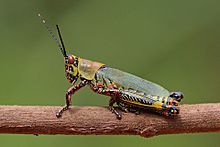
|
Grasshopper | chirp[27] | |

|
Guinea pig | wheek[28] | |
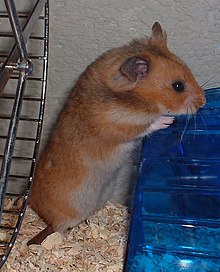
|
Hamster | squeak[29] | |

|
Hawk | screech | |
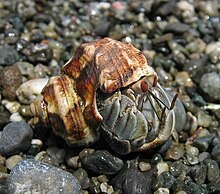
|
Hermit crab | chirp[30] | |
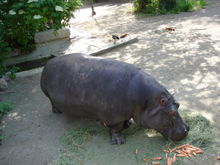
|
Hippopotamus | growl[31] | |
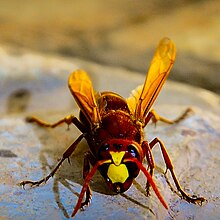
|
Hornet | buzz | |

|
Horse | neigh, whinny, nicker, hoofbeats (clip-clop) | |
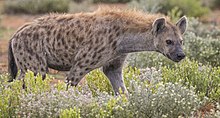
|
Hyena | laugh | |

|
Jackal | gecker[6] | |

|
Koala | bellow, shriek | |

|
Kangaroo | jump | |

|
Laughing kookaburra | laugh | |

|
Lemur | chatter, whoop | |

|
Leopard | roar, growl, snarl | |

|
Linnet | chuckle[32] | |

|
Lion | roar, growl, snarl | |
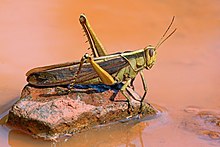
|
Locust | chirp[27] | |

|
Magpie | chatter[33] | |

|
Monkey | scream, chatter, gecker,[6] howl | |
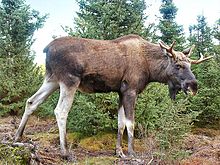
|
Moose | bellow[34] | |

|
Mosquito | buzz, whine | |

|
Mouse | squeak | |

|
Okapi | cough, bellow[35] | |

|
Owl | hoot, hiss, caterwaul for barred owls, twit twoo for tawny owls [36] | |

|
Ox | low, moo | |

|
Parrot | squawk, talk | |
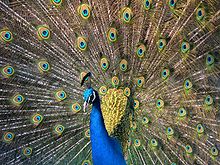
|
Peacock | scream,[37] squawk, honk | |

|
Penguin | chirp, honk, trumpet, bray | |

|
Pig | oink,[31][38] snort,[39] squeal, grunt | |
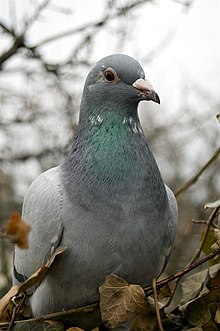
|
Pigeon | coo | |

|
Prairie dog | bark[40] | |

|
Quail | call | |

|
Rabbit | squeak | |

|
Raccoon | trill[41] | |
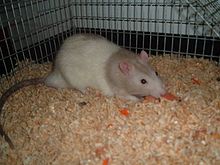
|
Rat | squeak | |

|
Raven | caw, cronk | |

|
River otter | blow, chatter, chirp, creek, grunt, hiccup, hiss, scream, squeak, swish, whine, whistle, chatterchirp,[42][43] purr[44] | |

|
Rook | caw | |
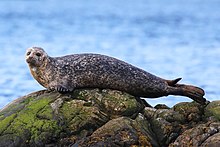
|
Seal | bark[45] | |
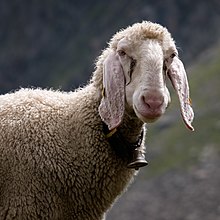
|
Sheep | bleat, baa, maa, meh (lambs) | |
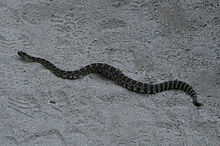
|
Snake | hiss, rattle | |

|
Songbird | chirrup, chirp, tweet, sing, warble (larks / warblers / wrens),[46][47] twitter (sparrows)[48] |
|

|
Squirrel | squeak | |
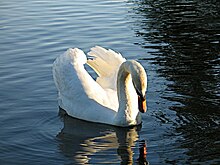
|
Swan | cry, trumpet, bugle | |

|
Tapir | squeak[49] | |

|
Tokay gecko | croak[50] | |

|
Turkey | gobble | |

|
Whale | sing | |
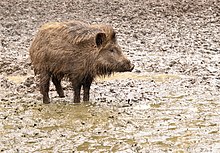
|
Wild boar | growl, grumble | |

|
Wildebeest | low, moo | |

|
Wolf | howl, growl, bay | |

|
Zebra | bray, bark, whistle, yip, nicker |
See also
[edit]- Animal communication
- Animal epithet
- Animal language
- Bioacoustics
- Cat organ & piganino
- Cross-linguistic onomatopoeias
- Field recording
- List of animal names
- List of onomatopoeias
- "Old MacDonald Had a Farm"
- "The Fox (What Does the Fox Say?)"
References
[edit]- ^ "Important Question: What Sound Does An Alpaca Make?". Modern Farmer. 24 September 2015. Retrieved 29 October 2021.
- ^ Caro, Tim (2005). Antipredator Defenses in Birds and Mammals. University of Chicago Press. p. 250. ISBN 9780226094366.
- ^ Schwartz, Charles Walsh; Schwartz, Elizabeth Reeder (2001). The Wild Mammals of Missouri (2nd revised ed.). University of Missouri Press. p. 316. ISBN 9780826213594.
- ^ Boughman, Janette Wenrick; Wilkinson, Gerald S. (1999). "Social Influences on Foraging in Bats". Mammalian Social Learning: Comparative and Ecological Perspectives (72). University of Cambridge Press: 195.
- ^ "Big Cat Facts". Animal Facts Encyclopedia. Copyright by Jenise Alongi. Retrieved March 17, 2016.
- ^ a b c Estes, Richard (1991). The Behavior Guide to African Mammals: Including Hoofed Mammals, Carnivores, Primates. University of California Press. p. 374. ISBN 9780520080850.
- ^ Schaller, George B. (1967). The Deer and the Tiger. University of Chicago Press. p. 261. ISBN 9780226736570.
- ^ Barros, Kamila S.; Tokumaru, Rosana S.; Pedroza, Janine P.; Nogueira, Selene S. C. (2010-11-22). "Vocal Repertoire of Captive Capybara (Hydrochoerus hydrochaeris): Structure, Context and Function". Ethology. 117 (1): 83–94. doi:10.1111/j.1439-0310.2010.01853.x. ISSN 0179-1613.
- ^ Why Do Roosters Crow?: First Questions and Answers about Farms. Time-Life for Children. 1995. ISBN 9780783508993.
- ^ Caughey, Melissa (2015). A Kid's Guide to Keeping Chickens: Best Breeds, Creating a Home, Care and Handling, Outdoor Fun, Crafts and Treats. Storey Publishing. p. 90
- ^ Winter, Lisa. The Ultimate Guide To Chinchilla Care. Simple Sequence Books. p. 24.
- ^ Power, Carla (September 4, 2000). "Ruins with A View". Newsweek International: 24.
- ^ "What sound does a crab make?". Answers. Retrieved October 17, 2020.
- ^ Holmes, Hannah (2005). Suburban Safari: A Year on the Lawn. Bloomsbury. p. 10. ISBN 9781596918115.
- ^ White, Gilbert (1837). The natural history and antiquities of Selborne. With The naturalist's calendar and miscellaneous observations. p. 449.
- ^ Wilson, Ben (1998). Dolphins of the World. Voyager Press. p. 29. ISBN 9780896585362.
- ^ Harley, Heidi E. (13 November 2007). "Whistle discrimination and categorization by the Atlantic bottlenose dolphin (Tursiops truncatus): A review of the signature whistle framework and a perceptual test". Behavioural Processes. 77 (2). Elsevier: 243–268. doi:10.1016/j.beproc.2007.11.002. PMID 18178338.
- ^ Metz, Lorijo (2011). Donkeys: Jennies, Jacks, and Foals. The Rosen Publishing Group. p. 10. ISBN 9781448806881.
- ^ "Caught in the Act - to Capture Bald Eagles on Film, a Husband-and-Wife Team Has Spent Years Perfecting the Art of Anticipation". National Wildlife. 39 (2): 24. February–March 2001.
- ^ Thomas, Jack Ward; Toweill, Dale (2002). Elk of North America, Ecology and Management. New York: HarperCollins. ISBN 0-8117-0571-4.
- ^ Ballard, Jack (2012). Elk: A Falcon Field Guide. Morris Book Publishing. p. 47. ISBN 9780762776269.
Elk vocalizations aren't reserved just for the bulls. Cows and ... Calves may respond to the cow calls with their own low bleats. When large ..
- ^ Mathis, Christine; Morton, E. Lynn (2010). Ferrets. Barron's. p. 87. ISBN 9780764143328.
- ^ "House Fly Sounds: How House Flies Generate the Sound We Hear | Orkin". www.orkin.com. Retrieved 2024-07-05.
- ^ "What does the red fox say?". Popular Science. 2019-01-07. Retrieved 2021-10-28.
- ^ Silverstein, Alvin; Silverstein, Virginia (1980). Nature's Champions: The Biggest, the Fastest, the Best. Random House. p. 19. ISBN 9780486428888.
- ^ Baotic, A.; Sicks, F.; Stoeger, A. S. (2015). "Nocturnal "humming" vocalizations: adding a piece to the puzzle of giraffe vocal communication". BMC Research Notes. 8: 425. doi:10.1186/s13104-015-1394-3. PMC 4565008. PMID 26353836.
- ^ a b Heinrichs, Anna (2002). Grasshoppers. Compass Point Books. p. 4. ISBN 9780756501662.
- ^ Gunter, Veronika Alica; Newcomb, Rain (2006). Pet Science: 50 Purr-fectly Woof-worthy Activities for You & Your Pets. Lark Books. p. 21. ISBN 9781579907860.
- ^ Bartlett, Patricia Pope (2003). The Hamster Handbook. Barron's. p. 37. ISBN 9780764122941.
- ^ Wilkins, Kelli A. (2007). Hermit Crabs For Dummies. Wiley Publishing. ISBN 9781118068267.
- ^ a b Symons, Mitchell (2012). The Bumper Book For The Loo: Facts and figures, stats and stories – an unputdownable treat of trivia. Random House. p. 364. ISBN 9781448152711.
- ^ Le Clerc, Georges Louis (1793). The natural history of birds, from the Fr. of the count de Buffon. p. 54.
- ^ Birkhead, Tim (1991). The Magpies: The Ecology and Behaviour of Black-Billed and Yellow-Billed Magpies. T & AD Poyser. p. 250. ISBN 9781408137772.
- ^ "Moose". International Wildlife Encyclopedia. Marshall Cavendish. 2002. p. 1656.
- ^ Lindsey, Susan Lyndaker; Green, Mary Neel; Bennett, Cynthia L. (1999). The Okapi: Mysterious Animal of Congo-Zaire. University of Texas Press. p. 34. ISBN 9780292788329.
- ^ Trust, Woodland (2023-12-21). "Identify UK owl calls". Woodland Trust. Retrieved 2024-02-13.
- ^ Attarde, I. P. (2007). Encyclopedic Graded Grammar. Vol. 1. LULU. p. 25. ISBN 9781435707177.
- ^ "Oink." Merriam-Webster. 26-01-2016.
- ^ QA International Collectif (1999). So Many Ways to Communicate - A new way to explore the animal kingdom. Québec Amerique. p. 29. ISBN 9782764409213.
- ^ Valerie V. Tynes, ed. (2010). Behavior of Exotic Pets. Blackwell. p. 149. ISBN 9781118710135.
- ^ Siegel, Mordecai (2004). The Cat Fanciers' Association Complete Cat Book. HarperCollins. p. 136. ISBN 9780062030399.
- ^ Walkley, Sarah (Spring 2018). Vocalizations of North American River Otters (Lontra canadensis) in Two Human Care Populations (MA Thesis). University of Southern Mississippi. Retrieved 12 November 2022.
- ^ Walkley, Sarah; Zapetis, Maria; Lyn, Heidi (2018). "Vocalizations of North American river otters ( Lontra canadensis ) in two human care populations". The Journal of the Acoustical Society of America. 144 (3_Supplement): 1954. Bibcode:2018ASAJ..144.1954W. doi:10.1121/1.5068543.
- ^ Pesaturo, Janet (11 February 2020). "River Otter Vocalizations: the Purr". Winterberry Wildlife. Retrieved 12 November 2022.
- ^ McCausland, Jim (May 2005). "Hood Canal Hideaway: Between Seattle and the Olympics, an Unsung Getaway Just Got Better". Sunset. 214 (5): 64+.
- ^ Rao, S. N. (2004). Strengthen Your English. V. V. K. Subburaj. p. 26. ISBN 9788172540531.
- ^ Stallcup, Rich (1993). Birds of California: A Guide to Viewing Distinctive Varieties. American Traveler. p. 38. ISBN 9781558381322.
- ^ Sharma, S. D. (2007). A Text Book of Scientific and Technical Communication Writing for Engineers and Professionals (3rd ed.). Sarup & Sons. p. 365. ISBN 9788176257510.
- ^ Endangered Wildlife and Plants of the World. Marshall Cavendish. 2001. p. 1460. ISBN 9780761471943.
- ^ Perez, Larry (2012). Snake in the Grass: An Everglades Invasion. Pineapple Press. p. 55. ISBN 9781561645138.
External links
[edit]For a list of words relating to animal sounds, see the en:Animal sounds category of words in Wiktionary, the free dictionary.
Wikimedia Commons has media related to Audio files of animal sounds.
- List of animal sounds to download, listen and use for free.
- Multilingual list of animal sounds Derek Abbott, University of Adelaide
